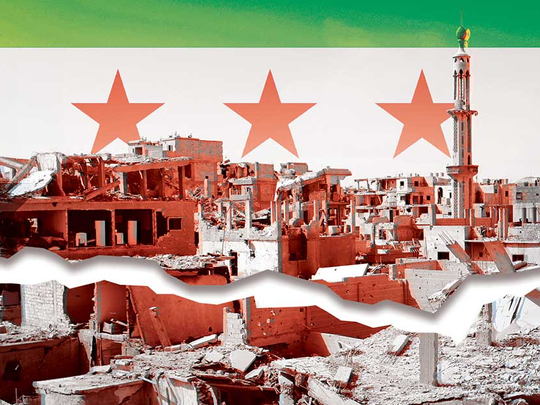
The desert city of Raqqa, the once famous “capital” of Daesh (the self-proclaimed Islamic State of Iraq and the Levant), has finally been liberated — or reoccupied, depending on who one talks to in the complex world of Syrian politics. The Arab tribes of Raqqa, the sixth largest city in Syria, claim that Raqqa just went from one occupation to another, claiming that the Kurds, like Daesh, are not the inhabitants of Raqqa and should never be its permanent residents.
The battle was not easy, due to Raqqa’s volatile countryside and its open borders with Aleppo in the west, Al Hassakeh in the east, and Deir Al Zour in the southwest. Technically, the city was sitting atop a huge reservoir of water, making digging tunnels impossible for the terrorists. Its buildings are low, eliminating the chance of snipping, and the streets wide enough for tanks to pass through them. The city itself was among the last to enter the Syrian conflict, with President Bashar Al Assad praying at one of its mosques as late as June 2012. Nine months later, it was overrun by Jabhat Al Nusra, ironically on the 10th anniversary of the United States’ occupation of Baghdad. In 2003, the US troops tore down a statue of Saddam Hussain and draped it with the Stars and Stripes. Ten years later, Al Nusra tore down a bronze statue of Hafez Al Assad, replacing it with the black flag of Al Qaida. The extremist group ruled Raqqa for 18-months, until it fell into the clutches of Daesh in 2014. Three years later, it is now fully in the hands of the Kurds, making many players unhappy, both at home and in the region.
For starters, Iran is unhappy with the developments in Raqqa. First, it wanted a share in the honours of liberating the city from Daesh — similar to the ones it recently got with the Turks in Idlib, via the Astana Process. Secondly, Tehran is aware that US President Donald Trump’s agenda in Syria is very different from that of former president Barack Obama. He is completely uninterested in regime change, or Syrian politics at a micro-level, but rather since coming to power last January, is focused on three main policies in Syria: The first, almost completely done, is eradicating Daesh from Syria. Second, he wants to reward the Kurds, whom he considers the most effective domestic allies in the war on terror. Effectively, every single Syrian military group once on the CIA payroll has been crossed off, with the sole exception of the Syrian Democratic Forces (SDF), who just declared victory in Raqqa on Tuesday. So that Trump policy too, has been satisfied. Last on the list is clipping the wings of Iran and ejecting its proxies from Syria — something that Trump will now focus on, after handling the Kurds and Daesh.
Turkish President Recep Tayyip Erdogan is also furious, for good reason. Last March, he had telephoned Trump, seeking approval for a Turkish invasion of Raqqa. He expressed willingness to support any operation — even by the Syrian Army — but not the Kurds. Trump famously refused to commit, continuing to send anti-tank weapons, mine detectors, radar equipment, and military vehicles to the Kurds, helping them complete their advance on the city. What horrified Erdogan was a statement by the SDF, saying that once liberated, Raqqa would be annexed to Syrian Kurdistan. Erdogan had been working closely with Moscow since August 2016, letting the Russians take Aleppo only after receiving assurances that a Syrian Kurdistan would never see the light on his borders. To annex Raqqa means to depopulate its Arab residents and replace them with ethnic Kurds, possibly, members of groups on Erdogan’s wanted list, like the People’s Protection Units and the PKK.
Meanwhile, the Syrian opposition is worried that the Kurds will hand Raqqa to Damascus, just like they did with Manbij, which was presented to government forces by the SDF in mid-2016. Damascus stood by and watched the liberation of Raqqa in relative silence, with no loud words of condemnation like the ones used to trash the Turkish invasion of Idlib earlier in October. One month ago, it allowed communal elections to take place in three different Kurdish provinces, with no hindrance, while Damascus-based Kurds who voted were neither arrested nor harassed. Nothing in the horizon shows that they will be prevented from holding municipality elections early next month or parliamentary ones in January for the Kurdish-backed “Federal Government of Northern Syria”. Speaking to Russian TV, Foreign Minister Walid Mua’alem noted that Kurdish autonomy within the framework of the Syrian state was “negotiable”.
Many in the opposition believe that an under-the-table agreement has been reached between the Russians and the US, on who takes what in Syria. As the Kurds solidify their hold over Raqqa, government troops are making major progress in Deir Al Zour and its countryside city of Mayadeen. Meanwhile, the Turks are deploying their troops in Idlib while Russian forces are expanding on all three corners of Syria — leaving the upper left side for the Kurds to manage, under the watchful eye of the US. More than ever, this has made the Syrian battlefield look more like a chessboard today, rather than a war zone.
Sami Moubayed is a Syrian historian and former Carnegie scholar. He is also the author of Under the Black Flag: At the frontier of the New Jihad.









